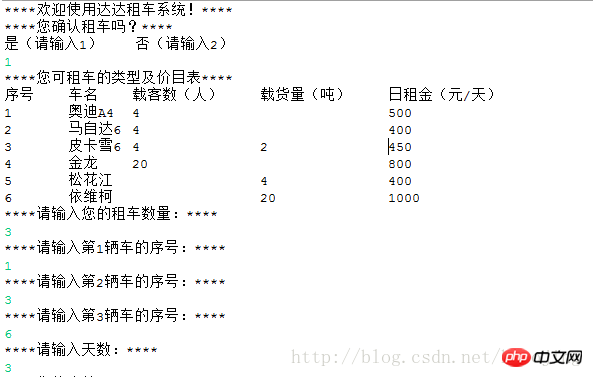Home >Java >javaTutorial >Detailed process of implementing car rental system in Java
Detailed process of implementing car rental system in Java
- Y2JOriginal
- 2017-05-08 16:00:153440browse
This article mainly introduces you to the steps of using Java to implement a Dada car rental system. The article gives detailed implementation ideas and sample codes, and provides complete source code at the end for everyone to learn and download. If needed Friends can refer to it, let’s take a look below.
This article introduces the use of Java to write a console version of the "Dada Car Rental System". I won't say much below, let's take a look at the detailed implementation method.
Achieve the goal
Write a console version of "Dada Car Rental System" in java
Realize function
## 1. Display all available rental vehiclesThree major analyzes
Data model analysis

Business model analysis

Display and process analysis

##Achievement effect
Car rental page


First define a Car class, which contains basic functions: car name, number of passengers, cargo capacity, and daily rental. Then create three subclasses, namely passenger car class, truck class and pickup truck class (which can carry both passengers and cargo). They all inherit
Car class. Finally, a main class is needed to start the entire system and call each subclass. Implementation codepackage com.jinger;
public abstract class Car {
public int rent;//日租金
public int people;//载客人数
public int loads;//载货量
public String name;//车名
public int getRent(){
return rent;
}
public void setRent(int rent){
this.rent=rent;
}
public int getPeople(){
return people;
}
public void setPeople(int people){
this.people=people;
}
public int getLoads(){
return loads;
}
public void setLoads(int loads){
this.loads=loads;
}
public String getName(){
return name;
}
public void setName(String name){
this.name=name;
}
}Passenger car class
package com.jinger;
public class PassageCar extends Car{
public PassageCar(String name,int people,int rent){
this.setName(name);
this.setPeople(people);
this.setRent(rent);
}
public String toString(){
return this.getName()+"\t"+this.getPeople()+"\t\t\t\t"+this.getRent();
}
}Truck classpackage com.jinger;
public class Truck extends Car {
public Truck(String name,int loads,int rent){
this.setName(name);
this.setLoads(loads);
this.setRent(rent);
}
public String toString(){
return this.getName()+"\t\t\t"+this.getLoads()+"\t\t"+this.getRent();
}
}Pickup truck class
package com.jinger;
public class Pickup extends Car {
public Pickup(String name,int people,int loads,int rent){
this.setName(name);
this.setPeople(people);
this.setLoads(loads);
this.setRent(rent);
}
public String toString(){
return this.getName()+"\t"+this.getPeople()+"\t\t"+this.getLoads()+"\t\t"+this.getRent();
}
}Main classpackage com.jinger;
import java.util.*;
public class Initial {
public static void main(String[] args) {
//对各类车实例化并保存到cars数组
Car[] cars={
new PassageCar("奥迪A4",4,500),
new PassageCar("马自达6",4,400),
new Pickup("皮卡雪6",4,2,450),
new PassageCar("金龙",20,800),
new Truck("松花江",4,400),
new Truck("依维柯",20,1000)};
System.out.println("****欢迎使用达达租车系统!****");
System.out.println("****您确认租车吗?****"+"\n"+"是(请输入1) \t 否(请输入2)");
Scanner in1=new Scanner(System.in);
int is=in1.nextInt();
if(is!=1){
System.out.println("****欢迎下次光临!****");
System.exit(0);
}
if(is==1){
System.out.println("****您可租车的类型及价目表****");
System.out.println("序号"+"\t车名"+"\t载客数(人)"+"\t载货量(吨)"+"\t日租金(元/天)");
//使用循环方式将各类车输出
for(int i=0;i<cars.length;i++){
System.out.println((i+1)+"\t"+cars[i]);
}
System.out.println("****请输入您的租车数量:****");
int num1=in1.nextInt();
Car[] rentcar=new Car[num1];
int price=0;//总价格
int totalpeople=0;//总人数
int totalloads=0;//总载货量
for(int i=0;i<num1;i++){
System.out.println("****请输入第"+(i+1)+"辆车的序号:****");
int numx=in1.nextInt();
rentcar[i]=cars[numx-1];
}
System.out.println("****请输入天数:****");
int day=in1.nextInt();
for(int i=0;i<num1;i++){
price=price+rentcar[i].rent *day;
}
System.out.println("****您的账单:****");
System.out.println("已选载人车:");
for(int i=0;i<num1;i++){
if(rentcar[i].people!=0){
System.out.println(rentcar[i].name+"\t");
}
totalpeople=totalpeople+rentcar[i].people;
}
System.out.println('\n');
System.out.println("已选载货车:");
for(int i=0;i<num1;i++){
if(rentcar[i].loads!=0){
System.out.println(rentcar[i].name+"\t");
}
totalloads=totalloads+rentcar[i].loads;
}
System.out.println('\n');
System.out.println("共载客:"+totalpeople+"人");
System.out.println("共载货:"+totalloads+"吨");
System.out.println("租车总价格:"+price+"元");
System.out.println('\n');
System.out.println("****感谢您的惠顾,欢迎再次光临!****");
}
}
}
HarvestThe idea determines the encoding.
Programming should focus on a top-down, step-by-step design approach.
1.
Java free video tutorial
2. Comprehensive analysis of Java annotations
3. FastJson Tutorial Manual
The above is the detailed content of Detailed process of implementing car rental system in Java. For more information, please follow other related articles on the PHP Chinese website!

